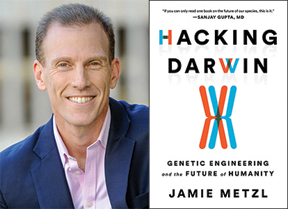
“Hacking Darwin: Genetic Engineering and the Future of Humanity,” by Jamie Metzl, Sourcebooks (2019) $25.99
A dear physician colleague recently died. His death may well be attributable to a genetic anomaly. The rare nature of the cancer he had and its insidious development has his best friends and closest research associates wondering about the genetic connection. Me too.
Jamie Metzl — an incredibly gifted young writer, technologist and futurist — believes that genetic engineering may hold promise for preventing or eradicating such tragic deaths and, in doing so, save lives for generations to come.
It’s an optimistic view that many share.
But my dear deceased friend would be the first to ask: So when we start changing people’s DNA, are we getting a little close to playing God? Especially if in the repair we rewrite genetic code for future generations? And, if you change this part of my genetic code, should you be able to change other aspects of my makeup? Should we really go there, even if we can?
Like it or not, Metzl writes, we are there and — now that our genetic identity cannot only be read but hacked — it’s time to get serious about addressing a host of questions about the future of humanity.
“Hacking Darwin” is a fast paced and fascinating look into the history of gene exploration, from the early days of Charles Darwin and Augustinian friar Gregor Mendel to the latest advances in CRISPR and CAR T-cell therapy offered legitimately by advanced academic research, medical and cancer centers around the world (and some not so legitimate experimentation as well).
Metzl’s expansive grasp of the issues and tight knit way of weaving the development of plant, animal and human genetic science into a tapestry worthy of thoughtful reflection kept me wondering where we were going next on this journey. He describes with fluid ease the concepts and impact of synthetic biology, gene mapping and alphabet soups of GMO and IVF. I learned more than I ever wanted to know about naked mole rats, but was captured by his descriptions of the diverse cultural factors and religious convictions that affect perspectives on this science.
It’s an ambitious book, perhaps a bit much for some readers, but I found it accessible and downright essential if we are going to engage in the discussions he calls for within our families, communities and society about what we ought and ought not to be considering.
Metzl encourages us to be curious and open to this journey. To contemplate what’s possible on the one hand and contemptable on the other. We have a sordid history in this country of accepting the arguments of eugenicists, and we’ve experienced evils worldwide when such theories have been allowed to run amok.
As we conquer the genetic code, as Metzl confidently claims we will, how could we possibly say no to mitochondrial therapies, the eradication of sickle cell disease or the annihilation of mosquitos that carry malaria?
My dear deceased friend would encourage us to explore the path that leads to human flourishing and caution us on the trail of self-indulgence and aggrandizement. I think Metzl would welcome that challenge, but he suggests a deployment of our best values, a dialogue that will be difficult, painful and conflict ridden, for we will not easily agree on the goals or the path. He admonishes that conversation must begin with urgency. We can’t leave it to chance, nor to tomorrow.
Darwin’s been hacked and the future of humanity is entrusted to us in ways never before imagined.
This need not be a dystopian moment, but to avert disaster we must set ourselves on a path to respectful dialogue, thoughtful reflection and authentic discernment. Safe journey to all of us.
John G. Carney is president and CEO, Center for Practical Bioethics.
Metzl to present lectures
Jamie Metzl, author of “Hacking Darwin: Genetic Engineering and the Future of Humanity,” will present free lectures titled “My Future, My Family: The Ethics of Engineering Ourselves” in Kansas City next week. The lectures will explore the genetics revolution and discuss the following questions: Will we use genetic engineering to expand or limit our humanity? How will genetic engineering affect diversity, equality and justice? Who will make decisions that could affect the entire human gene pool?
Metzl will speak at 4 p.m. Monday, April 1, at the Kansas City Public Library Plaza Branch, 4801 Main St., Kansas City, MO. On Tuesday, April 9, he will speak at 9 a.m. at Kansas City University of Medicine and Biosciences, 1750 Independence Ave., Kansas City, MO. Both lectures have limited seating, register at practicalbioethics.org/events-education/events-calendar.html. For more information, email or call 816-979-1357. Tuesday evening Metzl will also speak at the Center for Practical Bioethics’ annual fundraising dinner.
The lectures are presented by Center for Practical Bioethics and Kansas City University of Medicine and Biosciences and co-sponsored by BioNexus KC, KC Digital Drive, Linda Hall Library, The Barstow School and Young Friends of the Kansas City Public Library.


